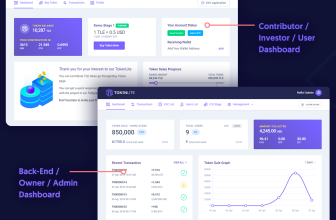Start a Blockchain powered Travel Data Exchange Platform
Travel data Exchange on a decentralized blockchain-based platform is built to serve as a data exchange for the travel industry.
Limited access to the data of consumers or travellers has irked the small and medium-sized businesses and this led to the proposition of the platform which puts forth the idea of a global database that contains the most comprehensive and fair information about suppliers and consumers of the travel market.
Did you know? Most of the personal user data and their preferences are hidden under the intermediaries like Google, Amazon etc. which are corporates ruling the area of interest. Data collected is insufficient to deliver a better experience to the traveller, because it lacks customization and has only assumptions.
The business community loses track of their customers after they have made their purchase and spends more money to attract new ones. This blockchain based platform is a solution that encourages users to share their data and preferences directly to the travel specialists and thereby avoiding the need for accepting a package delivered blindfolded. It gives users the authority to manage their own data thereby enforcing Privacy and Security, and that’s their Mission. It is also an open source data exchange platform which is governed by its users and no central authority.
[button content=”View Demo” color=”teal” url=”https://www.youtube.com/watch?v=_pECUlD2LXo” openin=”_self”]
[accordion]
[item title=”Why should you start a blockchain based travel data exchange platform?“]
The blockchain based Travel data exchange is a home for data pertaining to not just the users, but also the service providers in the travel industry. Public information is stored in open form and users could choose to encrypt their personal or private data. It basically builds a Traveler’s passport which will store different types of travel-related data unique to an individual and this is stored in a public ledger. Therefore, the below-listed information is a snapshot of what the blockchain based travel data exchange platform can contain:
Transaction History
Review and Feedback
Movements and Visited Places
Accommodation
Location
Events and Services
Commodities
User Personal Information and much more
It can track user activities like the country he/she visited, the cuisine they like, their favourite sport etc. to build a portfolio and this is used to customize the experience for the user. This can also serve as an inspiration for companies to offer personal offers rather than wasting money on advertisements. The platform benefits both businesses and travellers. For each permission to use data, the user gets tokens, These tokens which are a native currency offered by the platform, can be exchanged for money or a tourist service. This a fuel that keeps the ecosystem functioning, below listed are few of its important uses that keeps it alive.
The platform is used to:
Obtain personal user information
Create and submit advertisements
Upgrade the customer accounts based on the requirements
Pay for core travel services like the transport charges, accommodation, entertainment services utilized during the travel etc.
Pay for extra services within the platform such as for those provided by computer-aided education tools and AI, reputation agencies and more
[/item]
[item title=”How does the blockchain powered Travel Data Exchange platform make Money?“]
Companies in the travel industry enjoy profit as they now can waive-off the extras that were paid to the intermediaries to help promote their services or products
The platform bridges the gap between service providers and the customers. This helps customers obtain a highly customized travel package as a result of the service provider’s direct dealing with them
It gets recommendations for respected/popular leaders or celebrities and they are serviced by a provider at a discounted price, seeking only a review from them that would back their business and hence earns more profit
The decentralized, open-to-all database helps the developers to focus on creating the applications and monetize them using travel tokens
The platform enables an opportunity to send and receive Direct Adverts. The user is given the authority to set the fees that he/she must receive in return for reviewing the ad from an advertiser in the network.
Advertisers receive information from the platform, all data that is required to create a custom advert. Sometimes recent information can also be collected, such as the location details etc.
[/item]
[item title=”What are the features?“]
Customized
A service provider is notified about a user’s visit to town and sees that the user is a vegetarian and practices yoga every day. He was able to retrieve this information from the user’s profile, interests etc. The service provider can send an invite to the customer if he can offer a room with vegetarian breakfast and a nearby yoga centre
Live
If an Italian restaurant receives notifications that some fans of the Italian cuisine have occupied spaces at the neighbouring hotel, it can offer them a special discount. By doing so, the restaurant will also save money that was to be invested in less efficient traditional advertising
Efficient
The small-scale businesses that run closer to hotels accommodating guests from different places will have no sufficient funds to pay for advertisements that would drive the tourists to their shops. The tourist ends up buying a product for a higher price when the small-scale business could have given the same for a cheaper deal. It is cost-effective, open to all and also rewarding.
[/item]
[/accordion]

Frequently Asked Questions (FAQs)
What is Blockchain?
The blockchain is a network of nodes (devices with an internet connection). It is a distributed and decentralized ledger technology which was re-introduced to support transactions of a digital asset called Bitcoin cryptocurrency. Now blockchain is used by many industries to implement their online businesses on a trust network like blockchain which keeps track of every single transaction and thus will eliminate redundancy, or duplication.



